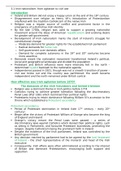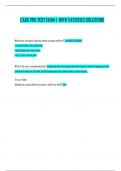3.1 Irish nationalism: from agitation to civil war
Introduction
Ireland and Britain did not enjoy a happy union at the end of the 18th century
Disagreement over religion as Henry VII’s introduction of Protestantism
interfered with the tradition Catholicism of the native Irish
Religion was a regular source of conflict and prominent factor in the
emergence of a distinctive Irish identity
By the late 1700s, religion was used to support a growing nationalist
movement around the ideas of American republicanism and evolving desire
for greater self-government
Development of Irish nationalism marks the start of Ireland’s struggle for
constitutional change:
o Moderate demand for greater rights for the established Irish parliament
o Radical demands for home rule
o Self-government over domestic affairs
o Demand for complete autonomy in the 19th and 20th centuries became
more assertive
Demands meant the nationalist movement transformed Ireland’s political,
social and geographical landscape and divided the population
Protestant and British influence were more intensely felt in the north –
determined loyalist backlash to the nationalist agenda
Independence passed in 1921, though was not a smooth transition of power –
civil war broke out and the country was partitioned: the south became
independent and the north remained under British control
How effective was Irish agitation before 1870?
The demands of the Irish Volunteers and United Irishmen
Religion was a dominant theme in Irish politics before 1774
Catholics trying to achieve greater toleration following the discriminatory
Penal Laws after 1691 which restricted their political rights
Protestants trying to retain dominance following William III’s accession to the
throne which established a Protestant ascendancy
Protestant ascendancy
Period of Protestant domination in Ireland (late 17 th century – early 20th
century)
Began after the victory of Protestant William of Orange who became the king
of England and Ireland
Orange’s victory meant the Penal Laws were passed – a series of
discriminatory laws against Catholics which denied their political rights, such
as sitting in Parliament, and favoured Protestant businesses, promoting the
religion, despite Catholicism being the prominent faith in Ireland
Despite the existence of the Irish parliament, Ireland was controlled by the
British government
Any decision reached by parliament had to be agreed by the lord lieutenant
of Ireland – the chief representative of the monarch and head of the Irish
executive
Consequently, Irish affairs were often administered according to the interest
of Britain and dominant Protestantism, encouraging both support and
opposition
,3.1 Irish nationalism: from agitation to civil war
Protestants largely agreed with British policies, particularly landowners who
benefitted from the favourable economic environment created by the Penal
Laws
Catholics adversely affected
Liberal minded Protestants disagreed with deliberately antagonising a
substantial proportion of the population
By the mid-1770s, Ireland was controlled by a British authority, so growing
discontent meant the country was in a vulnerable position
In the late 1700s, French and American revolutions broke out, giving these
nations new government, suggesting a different future for Ireland
The American Revolution (1775-83)
America also under British control
Physical distance from Britain promoted a distinct American identity,
encouraging a greater sense of autonomy resulting in war with Britain in
1775
Declaration of Independence published by Jefferson in 1776 – demanded
greater American political rights, promoted republican ideas and questioned
the right of King George III to rule in America
o Persuasiveness inspired rebellion against the king, sparking a 7-year war
with Britain which saw America gain independence
The Irish Volunteers (1778)
American Revolution had a profound effect on Irish politics
o Educated Irishmen on republicanism
o Saw the success they could enjoy if they stood up to the British
o Growth of a more thoughtful, forceful nationalist perspective
o Saw the militarisation of the country as many Protestant supporters
sought to defend Ireland’s borders against potential enemies when Britain
was away fighting
o Raised the prospect of greater Irish political rights, seeing the ideas of
republicanism filter into the country
Proposals for an independent nation were always blocked by patronage that
secured British majorities
Irish Volunteers and the poor performance of British forces in America meant
Britain was in a vulnerable position
Henry Grattan
o Supporter of Irish rights – both Catholic emancipation and legislative
independence during the 18th century
o Demanded Ireland to be granted its rightful status as an independent
nation under the same monarch as Britain
Aim To be granted its rightful status as an independent
nation under the same crown as Britain
Description Loyal-spirited Protestants in Belfast
Organised themselves into volunteer units of militia in
1778 to defend Ireland against a potential attack from
France or Spain
1782 – over 60,000 well trained militia ready to fight
Initially loyal to Britain as they sought to defend its
, 3.1 Irish nationalism: from agitation to civil war
borders
Also seen as a demonstration of patriotic sentiment by
starting to challenge British authority
Henry Grattan demanded Ireland to be granted its
rightful status as an independent nation under the
same crown as Britain
o Proposals always blocked by patronage in
parliament which secured British majorities when it
came to a vote
Methods Wore uniform as a mark of importance and loyalty
Regularly paraded, undertook military drills to prepare
for potential invasion
Significant Absence of attack meant they became debating
events/consequ societies where they discussed politics and other issues
ences of concern
By 1780, the right of Britain to legislate for Ireland was
reduced due to the American war and presence of a
well-organised and armed militia to support Irish
demands
Constitution of 1782 repealed the 1720 Act and
reduced Britain’s control over legislation in Ireland to a
right of veto
Mutiny Act meant Irish judges were irremovable except
by parliamentary action
Held a convention in 1783 to address the issue of the
lord lieutenant who held significant power over Irish
affairs
o Flood’s powerful oratorical style demanded
attention and his desire for a more representative
parliament was taken up in parliament
o Parliament refused their plans, and unwilling to use
force, the Volunteers just went home
A third convention was attempted in 1784, but it only
drew a handful of delegates and attracted little public
interest
Effectiveness Largely achieved its aim as Ireland technically became
an independent nation, sharing a monarch with Britain
Secured greater legal, political influence for Irishmen
Irish government still under the control of the lord
lieutenant who exercised considerable influence over
the Irish MPs as the government controlled the
patronage
Gradually diminished after 1783
The French Revolution
Irish Volunteers were complacent with their changes and unprepared to
actually attack parliament to secure further reform






